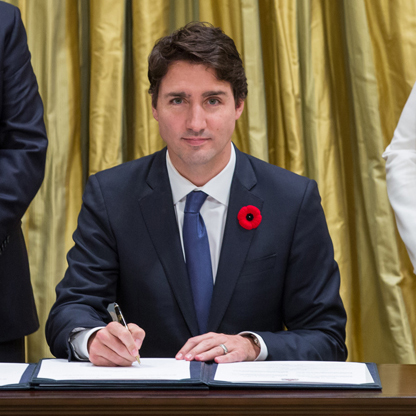The tap water at the Potlotek First Nation in Nova Scotia is discoloured, foul smelling and does not meet Canadian drinking water guidelines.
The good news is that officials from Indigenous and Northern Affairs (INAC) and Health Canada visited the First Nation community yesterday to announce that Potlotek will get a new water system.
The CBC reported that, “[INAC says] a group created to address the water problems in Potlotek was established more than a year ago, [and that] design work on the plant at the Potlotek reserve is due to begin soon but offered no specifics on when it would be completed.”
Potlotek Chief Wilbert Marshall said he estimates it will be two or three years before the new water system is functioning. For now, the federal government is supplying bottled and bulk water for drinking, housecleaning and bathing.
The Council of Canadians has repeatedly called on the federal government to invest $4.7 billion over ten years into First Nations’ water and wastewater services.
That specific figure is based on a national assessment of First Nations’ water and wastewater systems conducted by Aboriginal Affairs and Northern Development Canada in 2011. That report estimated it would cost $4.7 billion over a ten-year period to meet the department’s protocols for water and wastewater services for First Nations communities, including an immediate $1.2 billion to deal with high-risk systems.
Just after the Trudeau government’s first budget this past March, Council of Canadians water campaigner Emma Lui said, “Budget 2016 allocates $2.24 billion over the next five years for improving on reserve water and wastewater infrastructure and waste management. But [rather than the immediate $1.2 billion recommended, or even the $470 million a year called for in the Alternative Federal Budget], the government will spend $296 million in year one and $322 million in year two.”
While the average annual expenditure may be $448 million, a large portion of this spending has been back-ended. That’s significant because as in the case of the Potlotek First Nation, there can still be a gap of several years before a new water system is operational.
“Compared to Harper’s annual $165 million this is a definite improvement. But it still falls short of what is needed,” said Lui.
On Oct. 5, 2015, Prime Minister Justin Trudeau stated, “We have 93 different communities under 133 different boil water advisories across the country. [Serpent River First Nation] Chief Isadore Day has called for within five years there should be zero, and I’ve told the Chief and I’ve told First Nations many times, we agree with that, and a Canadian government led by me will address this as a top priority because it’s not right in a country like Canada that this has gone on for far too long.”
In April 2016, Trudeau visited Shoal Lake 40 First Nation on the Ontario-Manitoba border.
During that time, he said, “If I say we’re going to eliminate all boil water advisories in five years, and it ends up taking five-and-a-half years, or six years, I think I’ll be okay with that. And if it ends up taking 20 years, then I did break my promise. People say, ‘oh, it will cost this much.’ No, you don’t get to say that. This is Canada. We are a country wealthy enough to do this and to do this right. Because we have to. Not because we want to or because we promised to. Because it needs to be done.”
Given the federal government’s own report calls for $4.7 billion in spending for First Nations’ water and wastewater services, it does not seem likely that Trudeau’s budget commitment of $2.24 billion for water and wastewater infrastructure will enable him to eliminate boil water advisories within the next five years.
The Council of Canadians calls on the Trudeau government to increase its spending on First Nations’ drinking water and sanitation services, including an immediate infusion of $1.2 billion for high-risk systems in its upcoming federal budget that is expected in March-April 2017.
As Trudeau said, “Because it needs to be done.”
Like this article? rabble is reader-supported journalism. Chip in to keep stories like these coming.




